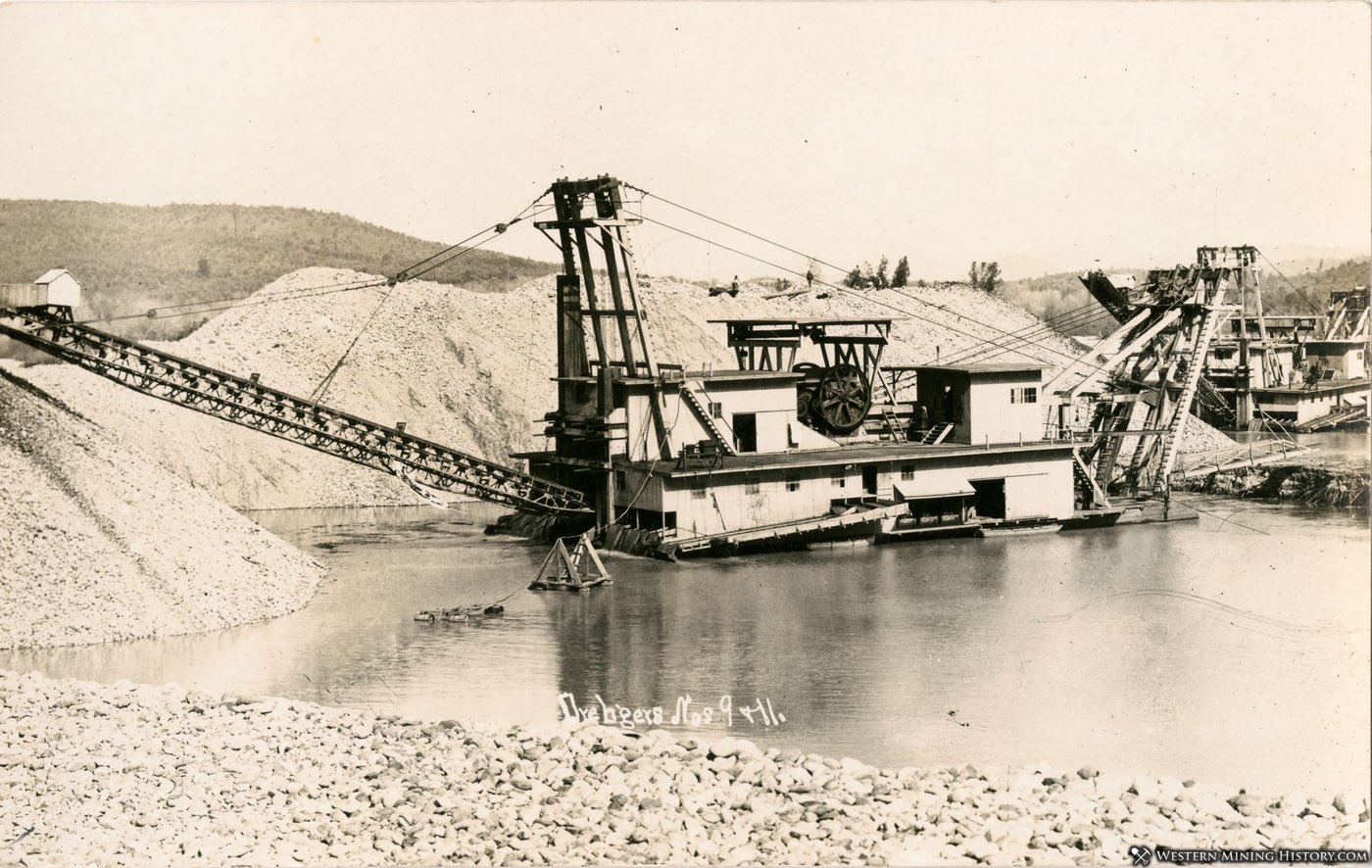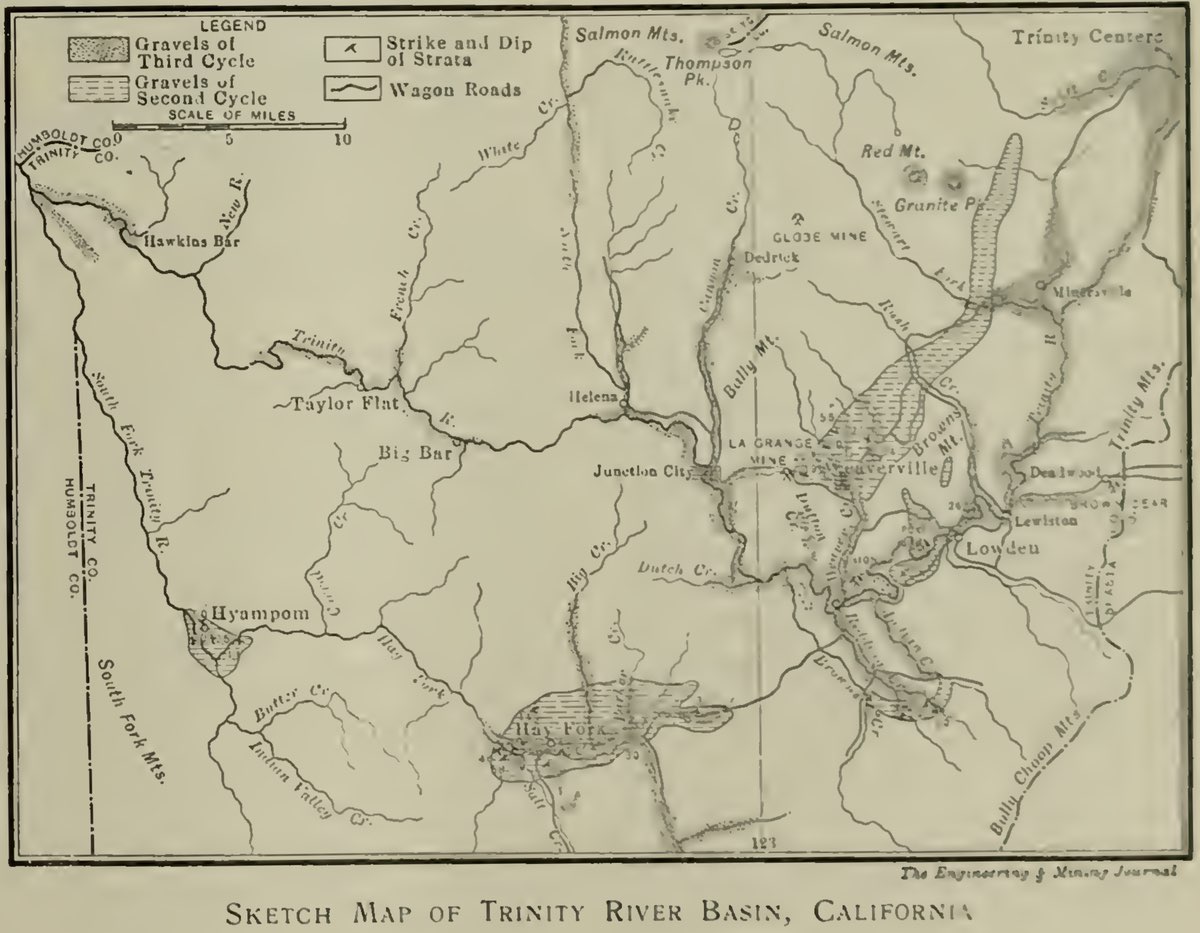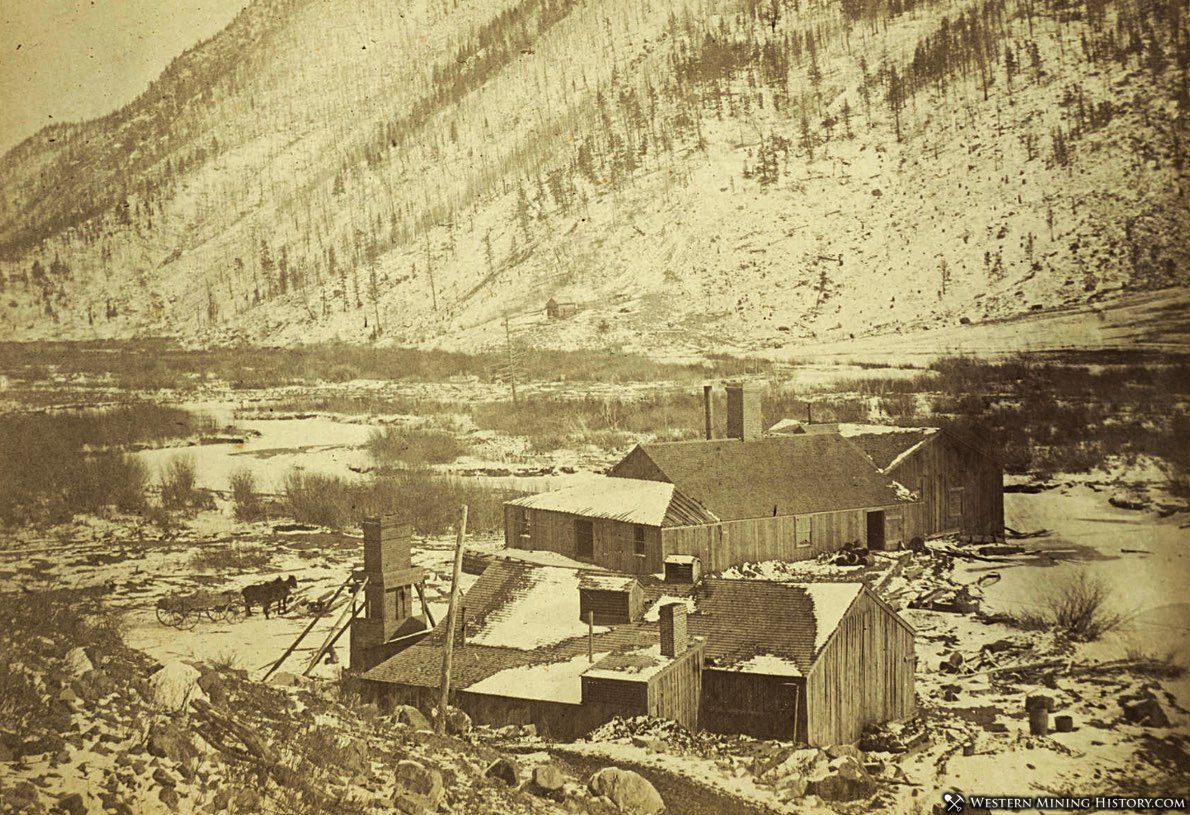
Premium content

Audio presentation
 Dredging for Gold in California
(1911 Engineering and Mining Journal)
Dredging for Gold in California
(1911 Engineering and Mining Journal)
Article details the gold dredging industry in California as of 1911. Many interesting details are recorded, including that California had at least 61 active gold dredges during that year.

 Trinity River Gravels of California
(1911 Engineering and Mining Journal)
Trinity River Gravels of California
(1911 Engineering and Mining Journal)
The Trinity River region in northwestern California has long been worthily noted for its placer mines, the working of which opened with a rush in the early ’50’s and has continued with more or less regularity ever since.

 The Ophir Mine (Virginia City, Nevada)
(1876 Engineering and Mining Journal)
The Ophir Mine (Virginia City, Nevada)
(1876 Engineering and Mining Journal)
Summary of the Ophir mine annual report details the destruction of the devastating 1875 fire, and discusses the great effort that went into rebuilding the mine infrastructure.
 The Georgetown Route to Leadville
(1879 Newspaper)
The Georgetown Route to Leadville
(1879 Newspaper)
Description of the road conditions and stage coach travel from Georgetown to Leadville in 1879. The article contains a fascinating description of early Kokomo.
 Jackson the Prospector
(1859 Newspaper)
Jackson the Prospector
(1859 Newspaper)
Article details George Andrew Jackson's discovery of gold at the site that would become Idaho Springs, considered the first significant gold strike during the Colorado gold rush.
 Central Idaho - A Rugged Mining Region
(1922 Engineering and Mining Journal)
Central Idaho - A Rugged Mining Region
(1922 Engineering and Mining Journal)
EM&J article describes the difficulty and remoteness of the mining regions of Central Idaho.
 Burro Steaks Now on Menu at Panamint Famous Ghost City
(1917 Newspaper)
Burro Steaks Now on Menu at Panamint Famous Ghost City
(1917 Newspaper)
San Bernardino Sun: Ghosts of a phantom city are to revive the fame of the once great camp of Panamint, known for a third of a century only in the memory of the men who were there and in later years in Charles E. Van Loan’s “Parson of Panamint.”
 The Stukey Party From Goldfield
(1905 Newspaper)
The Stukey Party From Goldfield
(1905 Newspaper)
"The John Stukey party, consisting of John Stukey, C. W. McGrew, H. L. Hanson and D. C. Locke, of Goldfield, arrived in Ballarat a few days ago, having come overland by way of Bullfrog."
 Wealth in Wonder District
(1907 Newspaper)
Wealth in Wonder District
(1907 Newspaper)
GOLDFIELD, Nev., March 16.— Browned as a berry from the sunburn and wind, J H. Macmiijan of the J. H. Macmlllan company, incorporated, returned during the week from a trip by automobile into Fairview, Wonder and Manhattan, where he was on a three weeks' tour of inspection of his various mining interests.
 Stewart Reduction Works
(1875 Newspaper)
Stewart Reduction Works
(1875 Newspaper)
Newspaper articles from 1869-1875 describe the design and operation of Georgetown's pioneering Stewart ore reduction mill. Of particular interest here is the text of a speech by J. O. Stewart to his fellow Georgetown citizens, a rare first hand account of an early and important Colorado mining man.

 The Ingersoll Rock Drill (1879)
(1879 Manufacturer and Builder Magazine)
The Ingersoll Rock Drill (1879)
(1879 Manufacturer and Builder Magazine)
Article describes the advantages of the Ingersoll rock drill.
 The Ingersoll Rock Drill (1874)
(1874 Manufacturer and Builder Magazine)
The Ingersoll Rock Drill (1874)
(1874 Manufacturer and Builder Magazine)
Article describes the advantages of the Ingersoll rock drill.
 History and Settlements of the Blue Mountains Gold Belt, Oregon 1900
(1900 USGS)
History and Settlements of the Blue Mountains Gold Belt, Oregon 1900
(1900 USGS)
While the gold fields in the southwestern part of Oregon were discovered about 1852, those of the Blue Mountains remained unknown until about ten years later......
 Rock-Boring with Diamonds
(1870 Manufacturer and Builder Magazine)
Rock-Boring with Diamonds
(1870 Manufacturer and Builder Magazine)
"the economical superiority of diamond drills over all others, even in rock drilling, however improbable at first sight, has now been perfectly established; and since the first application of the principle by M. Leschot, of Paris, France, in 1860, their use has extended over all the civilized world...."
Metal Mining Districts of Colorado
(Book)
Colorado metal mining district maps and descriptions compiled by the Colorado Geological Survey.
Idaho Mining Districts
Idaho mining district descriptions from the 1941 publication The Metal and Coal Mining Districts of Idaho by the Idaho Bureau of Mining and Geology
Washington State Mining Districts - Compiled Reports
Mining district descriptions from the 1943 publication Inventory of Mineral Properties in Chelan County, Washington by the Washington Department of Conservation and Development
Mining Districts of Nevada
This collection of over 475 mining districts in the state of Nevada was compiled from reports by the Nevada Bureau of Mines and the USGS.
Placer Gold Deposits of Arizona
Eighty-seven placer districts in Arizona are estimated to have produced a minimum of 564,052 ounces of placer gold from 1774 to 1968. The location, areal extent, past production, mining history, and probable lode source summarized for each district are based on information obtained from a wide variety of published reports relating to placer deposits. Annotated references to all reports that contain information about individual deposits are given for each district.
Mine Locations of the Chilson Brothers
From the May 15 1926 Arizona Mining Journal - the authentic history of the mining activities of the Chilson brothers who were active in the locating and developing of Arizona’s mineral resources.
![]() Dredging for Gold in California
(1911 Engineering and Mining Journal)
Dredging for Gold in California
(1911 Engineering and Mining Journal) 
![]() Trinity River Gravels of California
(1911 Engineering and Mining Journal)
Trinity River Gravels of California
(1911 Engineering and Mining Journal) 
![]() The Ophir Mine (Virginia City, Nevada)
(1876 Engineering and Mining Journal)
The Ophir Mine (Virginia City, Nevada)
(1876 Engineering and Mining Journal) ![]() The Georgetown Route to Leadville
(1879 Newspaper)
The Georgetown Route to Leadville
(1879 Newspaper) ![]() Jackson the Prospector
(1859 Newspaper)
Jackson the Prospector
(1859 Newspaper) ![]() Central Idaho - A Rugged Mining Region
(1922 Engineering and Mining Journal)
Central Idaho - A Rugged Mining Region
(1922 Engineering and Mining Journal) ![]() Burro Steaks Now on Menu at Panamint Famous Ghost City
(1917 Newspaper)
Burro Steaks Now on Menu at Panamint Famous Ghost City
(1917 Newspaper) ![]() The Stukey Party From Goldfield
(1905 Newspaper)
The Stukey Party From Goldfield
(1905 Newspaper) ![]() Wealth in Wonder District
(1907 Newspaper)
Wealth in Wonder District
(1907 Newspaper) ![]() Stewart Reduction Works
(1875 Newspaper)
Stewart Reduction Works
(1875 Newspaper) 
![]() The Ingersoll Rock Drill (1879)
(1879 Manufacturer and Builder Magazine)
The Ingersoll Rock Drill (1879)
(1879 Manufacturer and Builder Magazine) ![]() The Ingersoll Rock Drill (1874)
(1874 Manufacturer and Builder Magazine)
The Ingersoll Rock Drill (1874)
(1874 Manufacturer and Builder Magazine) ![]() History and Settlements of the Blue Mountains Gold Belt, Oregon 1900
(1900 USGS)
History and Settlements of the Blue Mountains Gold Belt, Oregon 1900
(1900 USGS) ![]() Rock-Boring with Diamonds
(1870 Manufacturer and Builder Magazine)
Rock-Boring with Diamonds
(1870 Manufacturer and Builder Magazine)